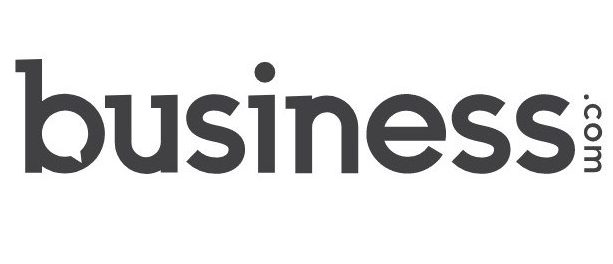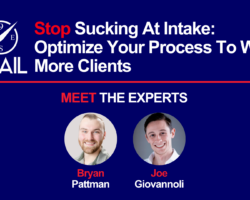Tip of the Law – Mastering Law Firm Leadership and Strategic Planning | John Remsen Jr.
Date: January 17, 2025
In this episode of Tip of the Law, Joe Giovannoli and John Remsen Jr. discuss the critical role of strategic planning in the legal industry.
As the legal industry continues to evolve at a rapid pace, law firms are facing increasing pressure to adapt and stay ahead of the curve. One critical element that can make or break a firm’s success? Strategic planning.
In a fascinating discussion on the Tip of the Law podcast, host Joe Giovannoli sat down with John Remsen, a renowned expert in law firm leadership, management, and marketing. Remsen, the President and CEO of the Managing Partner Forum, shared invaluable insights into the importance of strategic planning for law firms – and the common pitfalls that prevent many from realizing its full benefits.
The harsh reality is that strategic planning remains elusive for a significant portion of the legal industry. Remsen revealed that a staggering 50-60% of mid-sized law firms (those with 25-150 lawyers) do not have a written, firm-wide strategic plan in place. And even among those that do, the average “grade” for implementation is a mere C+.
So what’s holding firms back? According to Remsen, it often comes down to lawyers’ resistance to change. “Lawyers are very resistant to change and trying new things,” he explained. “The good old days are done, and we need to look forward to the good new days, but the senior lawyers often like to rest on the laurels and the way [they’ve] always done things.”
This cultural aversion to evolution is a formidable obstacle, but one that firms must overcome. As Remsen emphasized, “Businesses, in my opinion, of all types across industries, need some sense of where they’re going – a vision, a purpose, a plan. Absent a plan, we’re kind of hoping and praying and reacting to circumstances. And I think ‘hope and pray’ is not a particularly good strategy for any organization, particularly law firms.”
The solution lies in a strategic planning process that is inclusive, simple and action-oriented. Remsen advocated for an approach that engages all equity partners, as well as younger associates and support staff. The goal should be to distill the firm’s vision down to its core practice areas, target industries and client profiles – and then align the firm’s marketing, business development and recruiting efforts accordingly.
Crucially, the plan must be easy to understand and implement. As Remsen put it, “If your plan can’t fit on a three by five index card, it’s too long.” And rather than getting bogged down in lofty, aspirational goals, the focus should be on a handful of realistic, achievable initiatives that are assigned to specific individuals with clear deadlines.
Of course, execution is where the rubber meets the road. Remsen acknowledged the challenge of holding partners accountable, especially powerful senior lawyers who may resist change. But he emphasized the importance of strong leadership – from the managing partner on down – in driving the plan forward.
Ultimately, the firms that master strategic planning will be poised to thrive in the years ahead. As the legal landscape continues to evolve, a clear vision and proactive plan of attack will be the difference-maker. It’s time for law firms to stop “hoping and praying” – and start charting a deliberate course toward long-term success.
Key takeaways
- Strategic planning is crucial for law firms, but many struggle to implement it effectively. Only about 40% of mid-sized firms have a written strategic plan, and those that do often give it a “C+” grade for implementation.
- Overcoming lawyer resistance to change is a major challenge. Senior lawyers often resist strategic planning efforts, preferring to maintain the status quo. Empowering younger, high-potential lawyers to take on leadership roles can help drive change.
- Hiring non-lawyer professionals like COOs and marketing directors can significantly improve law firm efficiency and implementation of strategic initiatives. However, lawyers are often reluctant to cede control to non-lawyers.
- Maintaining firm culture and adapting to remote/hybrid work models are ongoing concerns for law firms. Strategic planning needs to address these evolving workplace dynamics.
Episode Transcript
Joe Giovannoli
You’re listening to the Tip of the Law podcast, where legal insights meet practical advice. In each episode, we bring you stories, insights, and tips straight from the legal industry’s brightest minds. I’m your host, Joe Giovannoli, founder and CEO of 9Sail. This week, I’m speaking with John Remsen, founder and president of the Remsen Group, a consulting firm that specializes in law firm leadership, management and marketing. With a wealth of experience in the legal industry, John helps law firms develop and implement strategic plans to improve their overall performance and profitability. He has worked with over 475 law firms and thousands of lawyers, primarily focusing on smaller and mid sized firms. His experience spans across creating cohesive strategies, enhancing business development efforts, and driving successful marketing initiatives. John is also the founder of the Managing Partner Forum, a leading resource for law firm managing partners and firm leaders. He is also a frequent speaker and author for major conferences and publications, including the American Bar Association and the Legal Marketing Association. John’s extensive experience and impactful work have made him the respected authority in the law firm management world. Without further ado, let’s get started. John, thanks for joining me today. I appreciate it.
John Remsen
Joe, thanks for having me today. I appreciate it.
Joe Giovannoli
So we’re gonna talk about some really cool topics today, and also get into the Managing Partner Forum. And what that is, I’m excited to talk about that, but strategic planning is something that is near and dear to your heart and something that you’re really passionate about. And I was wondering if you could just kind of share where that, some of that passion came from.
John Remsen
Well, full disclosure, I am not an attorney. Many people assume I am. But in the mid 80s, I was hired by a very progressive, forward thinking law firm in South Florida. We had 27 Equity Partners and a non lawyer– love the term non lawyer– CEO, and they really appreciated the fact that, yes, we’re a law firm and a profession, but we’re also running a business. We’re running a business. And businesses, in my opinion, of all types across industries, need some sense of where they’re going, a vision, a purpose, a plan as to where we want to take the organization. And I think law firms are not exempt from trying our best to create a shared vision among the owners and put initiatives in play that are going to likely take us there, absent a plan, we’re kind of hoping and praying and reacting to circumstances. And I think hope and pray is not a particularly good strategy for any organization, particularly law firms. The world’s a changing and it’s important that we keep abreast and embrace this notion of the business of law.
Joe Giovannoli
Yeah, the hope is not a plan that is, that’s a saying that I’ve lived by for a very long time. And I couldn’t agree more. You know, there, and, you know, John, with strategic plans, there are so many different frameworks and methodologies out there. You know, smaller, you know, entrepreneurial-minded law firms use entrepreneur, Entrepreneurial Operating System, EOS. I, you know, I’ve seen scaling up. I’ve seen hybrids of different things. You know, do you have a, like, a framework that you love or, you know, walk me through the thought process of how you help a firm to build a strategic plan?
John Remsen
Well, law firms are interesting animals, lots of opinions, strong opinions, thoughtful opinions, and lawyers tend to like their autonomy. They’re resistant to change and trying new things and and I often cite the research to Dr Larry Richards, which examines the lawyer personality. It’s really interesting stuff as we look at that lawyer personality. And the idea of of evolution, change risk is petrifying to most lawyers. So, so in many cases, that stops us right there, because we’re looking forward to where we’re going, it might not work. And so there’s a lot of skepticism among often senior lawyers that we’ve never done this before. We don’t need a plan. We’ve been successful without one, it’s going to raise issues that we’ve been gently sweeping under the rug for a long, long time. So I have a process and a very flexible, that’s a very inclusive one. I think it’s important that all the owners have an opportunity to weigh in, all the equity partners, equity shareholders, what have you, but the owners of the place. And let’s talk to our young lawyers as well, our associates, our support staff engagement– is a key aspect of talent retention, engagement, getting people’s input where we’re going and and it’s amazing how enthusiastic people can, can, can come to the process. We do surveys, we do interviews, all sorts of strategies to gain that input. And I think importantly, let’s not make this more complicated than it needs to be. And I think lawyers like to complicate things. And as we get through it, whatever we’re coming up with, I think should be really simple, the old KISS principle, the power of three and looking out five years, where do we see our firm in terms of its core practice areas, not everything we’ve ever done, but our core practice areas, the core industries we seek to attract the kinds of clients we want. And that suggests we align our marketing and business development and recruiting processes accordingly. I think our appetite for growth, most firms want to grow, okay, great, but thoughtful, strategic, proactive growth, and how are we going to get there? And I think geographic footprint is something to consider, as well, as more and more firms grow and expand into different markets and geographies. So taking in all this information and distilling it to a plan that’s simple, realistic, achievable, transparent, everybody can rally around it. And I think as we identify goals and objectives, we put people in charge, individuals, not committees, not task forces, individuals who have passion, credibility to get something done, give them a sense of mission, deadline, resources, and let’s actually achieve some initiatives. Yeah, and Joe, I’m sure you’ve seen it, the old strategic plan on the shelf where we go and we develop this plan and we push it aside because we’re zoned, so honed in on today’s billable hours, we often lose sight on tomorrow’s billable hours, and the planning is going to generate the future the future clients, the future practices, the future health and prosperity of the law firm.
Joe Giovannoli
So you brought up so much there– the billable hour. I’m going to put a cap on that for a second. But you know, as you’re talking, I’m thinking to myself, and again, I just shared that, you know. So I run my business on EOS, Entrepreneurial Operating System, which is essentially just a framework for having a really good strategic plan, you know, starting with the end in mind, right? So that’s another mantra that we live by here, is that let’s understand where we’re trying to go before we figure out how to get there, you know. But Mike Morse, I don’t know if you know that name, but Mike Morse wrote a book called Fireproof, and it was all about how he brought EOS into his law firm, and how he set goals and set a vision and ultimately set a course for his firm to grow to what he knew it could be. He’s wildly successful. It worked out really well, you know, but that strategic plan on the shelf, that is the kiss of death for any business. And again, law firms are businesses, so we might as well treat them as such, right? Not everybody, not everybody sees it that way. They think that they’re their own animal. But, you know, putting all that work into a strategic plan to then just put it on the shelf and say, “Hey, we did it” – you’re never going to get to where you want, you know you want to be, and if you do, it’s a it’s a random act of success. It’s not, you know, not because you were targeting something. You know what I mean.
John Remsen
And I see that all the time. We go through this exercise, get people ramped up, and nothing happens. And that’s just fuel for the skeptics to suggest, well, we tried that. That’ll never work here, because we’re a snowflake, our law firm and one thing you mentioned– the Managing Partner Conference. When we gather managing partners, there’s a realization among the new folks to our community that we’re not alone. Firms across the country, across the world, share many of the same challenges in terms of, you know, technology as an example, or talent retention or adapting to remote work models. You know, lawyers tend to be very resistant to change, and they look at precedent and and the past and where we’ve been, and that’s all fine and good, but I think it’s far more important to have clarity around where we’re going, where we’re going. We’re all on the ship, as owners of the firm, we’re all on the ship, and we all have an obligation, I believe, to the firm and to one another, to grab an oar and, and help the firm row the boat to where it wants to go. And that’s the hard part, because lawyers love autonomy, and they’re going to do whatever they want to do regardless of what the firm is suggesting. And my question is, do those folks belong as part of your firm? If they’re not good, good owners, right? Who respect the plan, who support the plan, who embrace and deliver on the plan. I think as owners, all of us have an obligation to contribute to the firm’s long term goals and objectives.
Joe Giovannoli
Yeah, right people, right seats, right? You need to have the right seats, and you need to have the right minds in the right seats. So absolutely, it’s so– and again, any business you know, we in our business, we spend a lot of time on that. We actually use a company called Culture Index to really help us with our hiring process, to make sure from the jump that we’re bringing in the right types of people. You know, who at the law firm do you feel should own the process of getting a strategic plan developed?
John Remsen
Well, that’s a great question, and the impetus to create a plan, if the firm’s never had one, often comes from a younger equity partner, someone new to the executive committee, and up and comer, and they’re all gung ho, but if the senior leadership isn’t on board, then I fear it’s not going to be successful. I think firm leadership must support it. From the managing partner, the executive committee members, the most senior among us, have to support this initiative and not just pay it lip service to keep the younger partners happy, because they want to see this plan. I find generally, younger lawyers are more appreciative of the notion, Joe, we’ve been talking about, is that we’re a business. We need a plan. There’s change all around us. The good old days are done, and we look, we need to look forward to the good new days, and that the senior lawyers often like to rest on the laurels and the way we’ve always done things. And I see often a little tension between the junior owners of the firm, who have a lot more life to their careers, and the pushback frequently comes from those senior lawyers in the corner offices, often making the decisions and writing the checks. So it really takes, I think, the managing partner, if the firm doesn’t yet have a plan, and about 50, 60% of mid sized firms do not, to make the case, present the evidence. Lawyers are very persuaded by evidence and benchmarking information, bring it on, make the case, win over those skeptics. And I think nothing is more influential than data and you know, the case studies of a firm you know where we were dealing with a room full of skeptics, but lo and behold, we want them over, and good things happen.
Joe Giovannoli
So that 50 to 60% of mid sized firms you talk to, you know, managing partners all the time, so I’m sure that you’re able to, really easily substantiate like that, that 50 to 60% that that’s actually shocking to me. I thought, I thought more firms would have had a strategic plan in place. So how, in your experience working with many managing partners, what are the major pushbacks you’re hearing from them as to why they’re not engaging with a strategic plan?
John Remsen
I think it’s scary to actually sit down and have difficult conversations, because through this planning process, we’re going to surface our challenging issues, and so often, firms are reluctant to tackle those issues directly in the name of collegial culture and collaboration, and we’re a happy family, but, but, but we all know, you know, families have issues, and either we ignore them or we set out to address them, and and so, yeah, this is unchartered stuff. Issues are going to rise. Difficult Conversations are likely to be had. And I think that’s a healthy exercise, a healthy exercise, yeah, and often, you know, I hear frequently, “Well, we’ve never done that before. We’ve been successful without a plan.” And you know, Leading Change, a book by John Carter, I often suggest as recommended reading to managing partners. It talks about leading change in an organization, and absent pain. It’s hard to change. It’s hard to change. So things have been rolling along pretty good for most smaller and mid sized law firms. We haven’t had to do this stuff. We’ve been successful in spite of ourselves. But I think as we look at the marketplace, the competition, the mergers, the impacts of technology, are really calling attention to the fact that, yes, law firms are businesses, and I think all businesses need plans. I think we can look to the regulatory reforms in Arizona and Utah that allow for alternative business structures and non lawyer ownership. There’s that non word, again, non lawyer ownership of law firms, private equity getting in there. And guess what? They want to return on investment, and so they’re going to bring a much more no nonsense, hard nosed business approach to running the firm right. Just some data. We’re big on collecting data from managing partners all the time. And we’ve asked over 20 years, does your firm have a written firm wide strategic plan? And we’ve seen that number hover around 40% and this is mid law generally, 25 to 150 lawyers, about 40% that number is bumping up, particularly post COVID, more and more firms are, I think, now that the dust has settled from COVID, looking at this and considering it, of those firms with plans we asked the managing partners to grade your firm’s implementation, A, B, C, D or F. Let’s keep it simple, C plus is about the average grade, so there’s plenty of room for improvement here on the implementation side, and then firms where the plan isn’t making an impact, a positive impact, in terms of cohesiveness, profitability, sustainability of your enterprise. And an overwhelming 90% will say, yes, that’s pretty compelling, yeah. And then we’ll further drill down and all right, what are the strategic initiatives upon which your firm is focusing? And so I like five years, what do we see our core practices, our core industries, and if it’s individuals, have a private client services group that targets high net worth, families and individuals. And here’s the array of services we offer. And then, based upon that five year vision, just three things, just three that we’re going to work on over the next 12-18 months that are realistic, achievable, impactful, and let’s get them done and not try to take on too much with too little, and all these aspirational goals, no one’s in charge of seeing them through. And we’ve seen some shifting– COVID freaked everybody out, and as we’re resetting, adapting to the remote work model, and why was that contentious for a lot of firms? Absolutely, and it’s still, we gotta figure it out.
Joe Giovannoli
It’s still very contentious. There’s a lot of firms that we talk to that, you know, they’re running a totally hybrid model, where they want their people to come into the office at some point, but they’re not putting a number on it. I know some firms that are requiring three days. I know some firms that are requiring five days a week in the office. And you know that it’s interesting because packs are recruiting, for sure, it’s a whole conversation around like, Hey, why are you going to drive amazing people if you have the right people in the right seats, truly, why is them attending the office such a concern for you, I can understand the junior attorneys, you want them to pick up and learn, and you want them to be face to face with some of their their senior colleagues. I can understand asking some of the senior folks to come in to mentor those, those junior folks. But that can be, don’t, don’t even get me started on that. You’re talking to a guy that runs a, owns a fully remote company with 10 employees across the country, and productivity is amazing. Like, it’s great, we have a great time. We’re very well bonded. Everybody is, you know, anyway, sorry.
John Remsen
Well, that was, hey, I hit one for you. That was, of course, a big issue, as we had to leave the office. There was little choice around that in most jurisdictions. But bringing folks back was more of a voluntary thing, and a lot of folks don’t want to come back, and some folks have been amazingly happy and amazingly productive. Others have struggled. Others have struggled. But then we moved from this remote work to the culture that became an obsession, and how are we going to build this collegial, collaborative culture when no one’s in the office, and how are we going to make that work? Well, it can work. You just have to do things differently, yeah, and evolve and adapt. And now we’re seeing a little bit of a shift on strategic priorities to profitability improvement.
Joe Giovannoli
Yeah, that is a, that is all the way coming down from the Am Law 50, that seems to be in the last 18 months, the biggest buzzword that people are talking about is increasing and improving profitability. Yep.
John Remsen
And we see it trickle down to our firm sizes we tend to play in, those smaller, mid sized firms.
Joe Giovannoli
I have a news flash for attorneys listening and managing partners listening. Look at what your rent costs you. Look at all of your additional utilities and services. Look at what that costs the firm. And think about one, that if you didn’t have that big of a nut every month, that big, shiny office– one, does it really impact your ability to sign and impress clients? And two, how much of that money could go back to, all the way back down to the bottom line of your P and L, right? Nobody thinks about it like that. And it’s kind of comical, because I have seen firms now– it’s, there’s a difference. If the firm owns the building or owns whatever, I understand that there’s a different mindset and model there. But for the firms that rent big space, they look at that as an investment, but they don’t look at marketing as an investment, right? Isn’t that an interesting correlation? And I have seen that. I’ve had, I’ve had that two sided conversation with managing partners of like, oh yeah, we invest in a big building because it’s really impressive, but marketing costs us so much money all in the same breath, right? So just an interesting thing, I want to, you touched on something earlier, and I want to–
John Remsen
Let me, let me back up here. You know, do clients really care that you’re in a fancy class-A office space on the top floor of the building? Do they really care? Some clients might, most don’t know, who cares– your employees, your associates. They want to be in the cool new space in the cool new neighborhood. And you can look at the shift among offices from midtown Manhattan over to Hampton Yards. And Skadden led that, and that’s the hip new area where young professionals want to be, more group space, more amenities around the building, and they’re looking at new offices downsizing, but offering that hoteling option for people who do want to work remotely and move into a part of town that’s cool and hip.
Joe Giovannoli
The law firm that I primarily use– I have three law firms that I use, the one that I primarily use for everything, they just downsized their office. They gave their team a hybrid approach, and they have a really nice, beautiful office in the financial district somewhere, you know, deep in the financial district, and their clients don’t really have to come visit them all that much, and if they do, they have a couple of nice conference rooms they can, they can use and whatever. And, you know, they’re in a building that, if they needed to, you know, get another space. There’s some space there, but, you know, I have to get, I don’t know for sure, but I have to venture to guess that it’s not, you know, they’re not paying beaucoup bucks to have this office, and it’s the same impact, you know, I I spend on legal services. I understand the space. It doesn’t bother me. If I walk into an office that’s, you know, even dingy. I don’t really care, right? As long as they’re doing great work for me.
John Remsen
You know, I don’t, I don’t need to work out, out of there every day. Doesn’t bother me. But I’ll challenge, you know, the profitability is not to be squeezed out on the expense side, I think most firms operate fairly leanly when you really drill down and look at their rent, their salaries, their insurance, marketing, technology, what have you. I think profits are to be achieved on the top line by– if we’re working the billable hour, we collect our time, and that’s really, really important, and we do It contemporaneously, and we get our bills out. We’re selective at intake. We just don’t take in any dog client not paying its bills. And I see that happening because, you know, partners, I set my rate, I bill my time however I want. I open a file for whoever I want. It’s like, really, you’re part of a firm, you’re part of a team, and I think it is part of our planning, identifying very clearly what we want, what we don’t want, right? And somebody’s keeping an eye at the door when it comes to, you know, getting that retention letter, setting those rates, and making sure we’re charging the bucks and getting paid for the time. Now, AI in this notion of value based billing, getting off the billable hour. Heck, we’ve been talking about this for 30 years, right? 30 years, but, but billable hour does remain king for most legal services, but I don’t know. 99.5% I think that’s gonna change. AI comes in and you know, computers will be replacing people. It’s already happening, associates, paralegals, all this draft document drafting and editing and research and such. We firms got to figure that out, and some firms will leap ahead of others. Yeah, and it’s happening fast.
Joe Giovannoli
Yeah, you can do more with less right now. You can. You can do more work with less people, because if you have the efficiencies around you, and this is the one thing that I have been talking non-stop to, let’s say, the 10-to-30-attorney managing partners– get yourself a COO, whether it’s fractional or full time, get yourself a COO, and you’ll be dumbfounded at all of this. This the the efficiencies that they can find for you and help you to create.
John Remsen
Right? Right. Couldn’t agree with you more. Couldn’t agree with you more. I’m frequently tipping that 30 lawyer, 25 lawyer firm to hire its first marketing director. Yeah, and you get the right person. Let them roll. It’s amazing, in hindsight, what took us so long to figure this out? So that C suite is really becoming increasingly important. But I find, Joe, and I’m sure you see it too, lawyers are often very reluctant to give anything of import to a non-lawyer. Yeah, well, and I think you and I agree that’s absurd.
Joe Giovannoli
I agree, and I want to challenge you though, right? Because I don’t want to– I would have bucketed probably a year ago before I came to your last Managing Partner Forum Conference, which I want to talk about, I would have agreed with you. But then I met an absolute rock star. I don’t know if he would want his name said here, so I’m not going to, but you and I both know who we’re talking about. I met a rock star, COO, who– the man had his finger so well on that pulse, and he was there. He was engaged. I watched people turning to him for Well, what do you think? What do you suggest? And I was like, this is, this is the reason why you need amazing, an amazing COO in your law firm, because they act like another owner, and they’re going to find you the best ways to do things, and they’re going to really be analytical about how you’re doing business. And now you’re no longer just a law firm practicing law, but you are a business that’s practicing law, and that’s that’s huge, right? That’s the big distinction. So you know, I always say there’s two things that I would do if I were a lawyer and I was running a law firm, or maybe if I wasn’t even a lawyer and I was running a law firm, I would hire a CEO, CEO, and I would hire a COO. But I would hire the COO before the CEO, because a lot of lawyers can get the business to a certain size demon stumbling around with a really good COO, or what we call in EOS, an integrator, right? Somebody that can take the ball for the vision and run and make sure things get done and make sure they get done efficiently, right? And then, you know, I would hire a CEO to really run the business like a business. So now you have a great CEO, great CEO. The lawyers are doing the work, and the lawyers are part ownership.
John Remsen
The lawyers are being lawyers, micro managers and dabbling in stuff they know little about, right? But I find that so often lawyers won’t let go, they won’t give up the control– they want to micromanage it. Yeah, and I see, I’ve been frequently, not frequently– I’d say, half a dozen times over my career, I’m working with a firm that wants to hire a COO, you know, their long time executive director, director of administration, whatever title retiring. And often it’s the managing partner’s legal assistant who morphs into this role as the firm grows. You know, first generation firm. We’re now a 40 lawyer firm, and we’ve got a legal assistant at the helm, and the old Peter principal said years ago, but we’re too nice to make tough decisions. We’re ready for the COO, we’re ready. We’re ready. And I challenge them. Are you? Are you ready to put that much authority, responsibility, empowerment, to someone that isn’t you. Oh, yeah, we’re ready. We’re ready. And then the person arrives on the scene. Turns out they weren’t ready. No, no, when that’s right, how come you don’t have your time in?
Joe Giovannoli
Yeah.
John Remsen
Let’s start there. That’s so basic. How come you don’t have your freaking time in? Yeah, we want to make more money. We’re working the billable hour. I mean, come on– and the accountability, that’s an important word. Are partners willing to be held accountable because they love their autonomy, and you start confronting a powerful partner, it’s hard. It’s hard leadership. And I think that same managing partner you mentioned, we were on a zoom call together a couple of weeks ago, he says, John, leadership’s hard. Leadership’s hard to call in this rogue behavior, perhaps chronic underperformance is not an easy thing, and there is going to be pushback. So I got to pick my battles, you know, and be thoughtful and and deliberate as I impact change as a law firm leader, as a managing partner.
Joe Giovannoli
Equity partners at law firms need to really put their thinking caps on and and get themselves to the point where they rewrite that part of their brain that says we can’t piss off Joe Schmo in office, the corner office down there, because he’s going to leave if we piss him off. Right? That’s the wrong mentality, because it means that you have somebody in the the firm that has more power than the managing partner, clearly, because they can do whatever the hell they want, right? And if everybody else sees that that person can do whatever they want, whatever they want, why are they going to do anything differently, right? So it starts from the top.
John Remsen
I agree, and it’s, it’s culture. It’s setting the tone. Are we on a, are we a team, or are we a collection of sole practitioners sharing space? That’s a fundamental question. If we’re a team, each of us contribute in different ways. We need– I bring the baseball analogy. We need hitting, we need fielding, we need pitching. We need bat boys. We need health trainers. We need a guy in the dugout. Not everybody’s on the field hitting home runs. We know our roles. We play off one another.
Joe Giovannoli
Yeah, and everyone, when you win the World Series, everybody gets a ring.
John Remsen
Everybody gets a ring. And we all can’t be what’s the Japanese guy playing out in Los Angeles? He seems to, seems to play every position really well.
Joe Giovannoli
Shohei Ohtani. Yeah, I’m waiting to see if I can find one that he doesn’t play.
John Remsen
Those are rare individuals. But rather, let’s, let’s find who our best rain makers are and turn them loose to hunt. Let’s figure out who our best mentors are. Put them in charge of our associate development and retention program. Let’s figure out who our really sharp technologists are, and have them serve on our beta group to integrate AI into the practice. Yeah, I think as well as a managing partner, often you have the authority to appoint department heads, practice group chairs, branch office, managing partners. And are we deferring to the seniors often we do, and they’re the ones resisting change frequently. Or are we finding those young go getters and giving them leadership opportunities? So break in that mold. Maybe we set up deputy practice group leaders. And you know, it’s interesting how frequently the senior lawyer will give up the chair of the committee once the deputy gets rolling right, and get some things going. And now we’ve got new leadership in place, and we’re impacting transition and grooming future leaders. So I’m all about tuning into your younger superstars, the folks who are going to drive your firm into the future and and acquiescing to what they’re interested in, and trying to overcome the objections that frequently come from, from senior lawyers who, you know, kind of on their ways out the door, and we let them have disproportionate influence on firm decision making.
Joe Giovannoli
Absolutely, and there’s a whole conversation. I think we definitely need a part two of this, because we can talk all about, we can, we can talk about the succession planning around that too, is make actually putting a plan in place and a strategic plan in place to take your high, what I would call high potential rock star attorneys, younger attorneys, and what’s the plan to, kind of, you know, churn, churn, the churn, the power, right, eventually, so phase two. But, you know, we’re coming up to the top of the episode. I want to spend a few minutes talking about the Managing Partner Forum. I’m going to draw an analogy for the folks that are, you know, running entrepreneurial law firms, Entrepreneurs Organization, EO as an organization I, you know, my mentor ultimately introduced me to in 2016. It has been so instrumental for my business’s growth. And I thought to myself, like, why is somebody not doing this for managing partners? Here’s John– meet John and Managing Partner Forum. And I had the pleasure to be at the conference this last, this last April, and I was like, Oh my God, he’s, he has, he has done it, like, this, this is it. So talk to me a little bit about what really started off the Managing Partner Forum, and why you do it originally.
John Remsen
They were selfish motives. I’m a big believer on the business development front. Find the communities where you’re going to find the fish you want to catch. Those target rich environments, often trade associations where you’re going to hit decision makers within an industry. I love industry, niche marketing and such. So here I am trying to develop work as a consultant for mid sized law firms. I define that as 25 to 100 lawyers. That’s my sweet stuff. I am, I am zeroed in on it, and within the firm, I want the managing partner. So, you know, if you want to reach the marketing folks, you’ve got LMA, if you want to reach the firm administrators and HR professionals, you involve yourself in ALA. And I went through those circuits. Where’s the managing partners? Did they hang? And it was an elusive club. I couldn’t quite find it. And so we started in Florida, a conference in 2002 and invited every managing partner in the state. We didn’t have the internet back then. I was going through Martindale, Hubble, counting the number of lawyers, trying to figure out who the managing partner is. And we threw our first conference, and they came and they loved it, that peer to peer interaction high level. We apply Chatham House rules, so this is a safe place to bring your issues, learn and share with and from each other. And so we do conferences, we do zoom calls, we do webinars, all these places to give managing partners community. And it’s amazing– once they feel comfortable; there’s a little apprehension at first. Once they feel comfortable, the exchange of information, the friendships, the bondings, we’ve seen merger discussions evolve from our conferences. So it’s been really fantastic. And you know, we’re doing a women’s conference as well in the fall, trying to empower women and law firm leadership, making strides, albeit slowly. But you know, women are incredible firm leaders, I think, yeah, given, given the chance. But you know, that’s a whole nother issue.
Joe Giovannoli
A whole nother topic. We can do a whole series on that.
John Remsen
I mean, yes. So, so strategic planning touches on all these things. And I think it’s just through the exercise, the inclusivity of the process I think is important, and coming up with something that’s really simple, realistic, achievable. It’s been said, if your plan can’t fit on a three by five index card, it’s too long. I tend to agree with that philosophy, and everybody within the firm should know the plan and their role to support it, from your lowest paid legal assistants and office runners and your receptionist all the way up the line. Don’t hold it secret. And I think you, you know, done right with a good steward of the plan, it can be a very impactful exercise.
Joe Giovannoli
Yeah, I think I have always been a big believer that an eight and a half by 11, one single sheet, one side of that, is more than enough to fit it. I think that I always thought three by five, if I had the card, the three by five card, I’d probably be squinting a little bit. But because I know my strategic plan has been planned out for 10 years, and it’s on an eight and a half by 11, and it’s very nicely spaced out and cleaned.
John Remsen
I suspect you’re ahead of most law firms.
Joe Giovannoli
Yeah, I would say so. I would hope so, right. Otherwise, why the heck am I sitting here? So I want to give a quick little plug myself again, having been on the faculty for the Managing Partner Forum conference last April for an– even for a non-lawyer, right? There’s the non lawyer for a non lawyer. That room was inspiring, and it was very impactful. The way that John breaks up the rooms and really makes sure that people get value out of folks that are, you know, running firms similar their size or larger, if they so choose to kind of go upstream. It’s just, it’s just amazing. I walked away with multiple pages of notes for myself, of things to think about for my business. And I was like, one page, Joe, one page, yeah, one page, yeah. Well, multiple pages of notes are okay. I’ll condense that later. I’ll use AI to condense my notes, but I just want to put a plug in there. You know, if you haven’t, you know if your managing partner, your marketer, is listening, if your managing partner is not going to or is not part of Managing Partner Forum, you are doing them a disservice by not putting it in front of them. So take a look.
John Remsen
It’s managingpartnerforum.org is our URL, and we’re, you know, somethingif you just want to taste us, we do a webinar series. It’s absolutely free, and every month we tackle the topic, bring on some guest speakers and do polling, live polling, and people love it. It’s vast. It’s interactive. You get great benchmarking data on our topics. So you know, just check us out. And if you like what you taste, you know, come back.
Joe Giovannoli
Yeah, absolutely. So we’re going to take a quick break here. We just wanted to take a moment to acknowledge our sponsor for the Tip of the Law podcast, 9Sail. 9Sail is a law-firm focused digital marketing agency specializing in providing lead generation and awareness building services such as SEO, paid search, content creation, and Digital Public Relations. Grow your firm with 9Sail.
Well, John, we end every one of these episodes asking our guests to leave everybody with one tip that they could easily bring back to their firm today to make an immediate impact. What would be the one thing you would tell our listeners to bring back to their firms to do and make an impact?
John Remsen
Well, I’ll speak to managing partners. And marketing folks, because you’re change agents within your organizations resistant to change. And I say it is, pick an initiative you think is realistic and achievable. And sometimes it’s easier to ask for permission than forgiveness. Make it so something’s visible, people can see it in and, you know, break that, you know, inertia often. You know, getting things rolling, getting things rolling leads to more, leads to more. I think, stop talking and act on a plan, and you’ll be a hero. Yeah, they might not like it at first, but, you know, done, right? You stick to it. Yep, you’ll, you’ll be thanked and appreciated for it.
Joe Giovannoli
It’s much easier and a lot of times much better to ask for forgiveness than permission. I agree with you wholeheartedly there and John, thank you for joining me here. And we’re definitely going to have another conversation about one of the other four topics. We could have gone down rabbit holes but I’m looking forward to sitting in on your next webinar, and very much looking forward to your next conference.
John Remsen
Thanks for having me. You’re doing a good thing. I’ve looked at the Library of these podcasts you’re doing, and it’s really important stuff. Well done. So keep it up. Thank you for having me.
Joe Giovannoli
I appreciate it. And to our listeners, thanks for tuning in and tune in next week for the next episode. Take care. Bye, listeners. Thank you for tuning in to Tip of the Law podcast hosted by Joe Giovannoli. If you’ve enjoyed today’s episode, be sure to subscribe to Tip of the Law and leave us a comment wherever you listen to your favorite podcasts. You’ve been listening to Tip of the Law.















